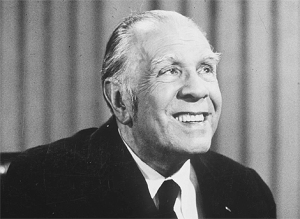As 2012 gets underway, I’m turning to Jorge Luis Borges for advice for this new year. I’ve never been one for resolutions; I find that no sooner have I made one, circumstances change, priorities shift, and what seemed of utmost importance on December 31st has become irrelevant by May. But as true as that may be, there is no denying that just as much as the close of one year brings about a mood of reflection, the start of a new one evokes a sense possibility, and that sense of possibility invariably gets one thinking about hopes and plans for the upcoming year.
With that on my mind, I lay in bed last night reading Borges. As I read and read, I came across two poems that seemed to fit my mood and thoughts perfectly. The first,
spoke to hindsight and thoughts of all the different ways that things could have gone, but didn’t… and God knows I’ve feeling a lot of that lately. The second spoke to the desire to live a life of meaning and joy. Taken together, these two poems form the kind of resolution that I can embrace.
Things That Might Have Been
I think of things that weren’t, but might have been. The treatise on Saxon myths Bede never wrote. The inconceivable work Dante might have had a glimpse of, As soon as he’d corrected the Comedy’s last verse. History without the afternoons of the Cross and the hemlock. History without the face of Helen. Man without the eyes that gave us the moon. On Gettysburg’s three days, victory for the South. The love we never shared. The wide empire the Vikings chose not to found. The world without the wheel or the rose. The view John Donne held of Shakespeare. The other horn of the Unicorn. The fabled Irish bird that lights on two trees at once. The child I never had.
I think its part of our nature to look at our past and wonder about the myriad paths that our lives could have taken. In and of itself, it’s not necessarily an unhealthy thing to do. But becoming mired in what may have been can be stunting and paralyzing if we allow it to take our focus on what we do have and on what actually is. This, I think, is one of those things that is easier said than done, and I know without a doubt that I’m struggling with it. But I’ve known people who live like this, and their lives seem clouded by a regret that never quite dissipates.
The Just
A man who, as Voltaire wished, cultivates his garden. He who is grateful that music exists on earth. He who discovers an etymology with pleasure. A pair in a Southern café, enjoying a silent game of chess. The potter meditating on colour and form. The typographer who set this, though perhaps not pleased. A man and a woman reading the last triplets of a certain canto. He who is stroking a sleeping creature. He who justifies, or seeks to, a wrong done him. He who is grateful for Stevenson’s existence. He who prefers the others to be right. These people, without knowing, are saving the world.
Here Borges gives us glimpses of a well-lived life, snippets of contentment, of generosity, of tenderness. He shows us a life whose meaning comes from simple pleasures, gratitude, and kindness; a life not defined by the external, such as wealth or position, but rather by what occurs in our minds and hearts. I know that this is the life that I want.
I had these poems on my mind when I woke this morning, and went on an internet search for more Borges. As I was clicking through various sites, I came across this. It’s an excerpt from an autobiographical documentary titled Images of Absence/ Buenos Aires, meine Geschichte (1998) by German Kral, an Argentinian filmmaker. This excerpt (I have not seen the entire film) includes an incredibly touching remembrance of an encounter with Borges, followed by words from the author himself. It’s from the filmmaker’s recollections of Borges that I found the third bit of sage advice for this new year.
Borges, who had so intensely loved books, and for whom literature was alive, advised us not to read any book we didn’t enjoy. He told us that morning that if we didn’t like a book, it was better to leave it for some other time. Reading it by force did no good to the book, the author, or ourselves.
Don’t dwell on what may have been and focus on what is. Live a life full of simple pleasures and with a gentleness of spirit. Read those books that you can truly enjoy. Thank you Mr. Borges, these are words of wisdom, indeed.
For more on Borges, watch Buenos Aires: Las Calles de Borges, a short documentary by Ian Ruschel, influenced by the German Kral documentary mentioned above. If you have a little more time, watch Jorge Luis Borges: The Mirror Man, a longer documentary that’s “part biography, part literary criticism, part hero-worship, part book reading, and part psychology.”

